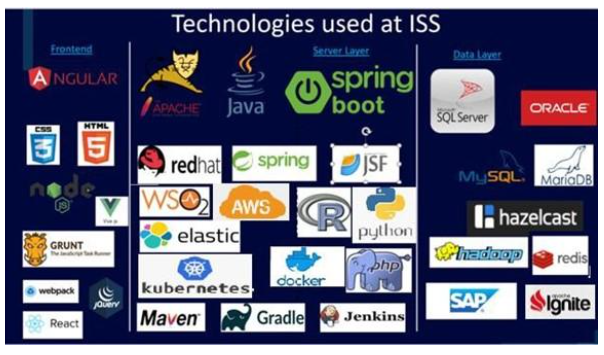ISS Stoxx - Interview Experience
 SHASHWAT TRIPATHI
SHASHWAT TRIPATHIAbout Institutional Shareholder Services
ISS STOXX GmbH is a leading provider of research and technology solutions for the financial market. Established in 1985, they offer top-notch benchmark and custom indices globally, helping clients identify investment opportunities and manage portfolio risks.
Tech Stack

Eligibility Criteria
Branches Eligible are BE (CMPN, INFT, AI&DS, ETRX and EXTC)
No live ATKT and No Gaps
Aggregate CGPI till current semester: 8.5 and above
Placement Process
The registration form was released on 17th July and the deadline to fill it was 18th July 2024.
PPT(Preplacement Talk) was on 22nd July.
Test and Interviews were scheduled for 23rd July.
Test
Google Form (to be taken in college labs)
Duration : 90 mins
Questions : 70
4 Sections : Java, Python, SQL & Aptitude
+1 for correct and -0.25 for incorrect answers
Java - 18 Questions
OOPs, Correct Output, Core Java, Other generic Java qns
Python - 17 Questions
Correct Output, Sets Tuples Lists Dictionary, Other generic Python qns
SQL - 5 Questions
Select the correct query
Aptitude - 30 Questions
Quants had the most weightage, logical was also asked
Since we had negative marking I first marked all those questions which were easy. Technical questions were pretty straightforward, you either get it right or have doubt between 2 options. Mark the easy ones and move on to the aptitude section. The apti takes more time to solve, so try to grab the easy ones first. After that, I revisited those questions which I got an idea of in the first traversal but could not solve it. Take a chance on marking the questions if you are confident enough about them. I solved 34-35 out of 40 Technical questions. I could have solved more aptitude questions if I had more time. Overall the test was easy if you know the basics very well and good solving speed is needed.
Out of 192 students appearing for the test, 57 were selected for Technical Interview.
Technical Interview
As I had applied for Software Engineer(1st Priority) and Analytical Verification(2nd Priority), I was majorly tested on my development skills.
The interview started with greetings from both sides. Then the interviewer asked me about my test. I answered honestly that it was good in my opinion and I could have done better with more time, to which she said it's okay you have done well. This was a good start to the conversation. Then I was asked to introduce myself. I had prepared an introduction covering all my skills, important projects, internships, and hackathon experiences. Then she asked what problem the project exactly solved. After that, I was asked about my hackathon experience.
I was given a pen & paper and then more technical questions were asked. I was asked about Caching (Cache Memory), and flushing algorithms if I knew any to which I answered LRU (Least Recently Used). Then a set of questions came back to back:
Which Data Structure will you use to implement LRU?
Why HashSet? To which I understood my mistake and corrected it to HashMap.
What is HashMap based on? (Ans: Hashing)
What is Hashing?
Implement LRU in Java
How does HashMap achieve O(1) insertion and deletion complexities? (Ans: It is an Array of Linkedlist and uses hashing to find the index faster)
Explain how HashMap works under the hood.
Resizing in HashMap
I was pretty confident while answering the above questions and all the follow-ups. Then I was given a Leetcode medium question and was asked to write the code for it. I had solved this question earlier so writing a solution was easy for me.
After this we moved on to the SQL queries, I was given 2 tables and was asked to write queries based on the conditions that were given to me. After each query, the level of difficulty was increasing gradually. After 6-7 queries it ended on nested queries.
Then I was asked about inheritance in Java. Its types and why Java does not support multiple inheritance normally? Next question was about interfaces, why we use them, what are abstract classes, what is the difference between abstract classes and interfaces, and the implements keyword. Then I was given an example of multilevel inheritance and 5 objects were constructed using different combinations of parent and child class references and constructors. I answered them all correctly.
Now, I was asked a puzzle. I could only get the minimum number of tests as 3, even after 5-7 mins of dry run on paper. So the interviewer gave a hint to start with the mixed jar first and then I got the answer easily(Ans: 1).
Then she asked if I had any questions for her. I asked a technical question: Since ISS Stoxx provides indices to its clients and there is no mention of some faster low-level language such as C++ or Rust, what does it use to achieve low latency and higher speeds? She was impressed with the detailed study of the company's tech stack and product.
My technical interview lasted for 1 hour. From 57 students only 21 were selected for the HR interview.
HR Interview
The HR interview was short and lasted for approximately 20 minutes. They asked me to introduce myself, and tell them about my academic background, family background, and why I wanted to join ISS. They asked me if I have a high aggregate CGPI, so why not go for higher studies, to which I answered that I don't have any plans for higher studies in the near future. Then I was asked how would I travel to the office. All these questions were easy and you just have to smile and answer them.
Then the panel asked if I had any questions. I asked: How does ISS help freshers like me to build a career that counts? (This is their tagline, so listen to the ppt carefully and study well about the company).
After the HR Round, 16 students were given Full Time Offers.
Tips
Try to steer the interview towards your strengths by mentioning them in your introduction.
If you don't know the answer, politely tell them.
Don't bluff, interviewers are experienced people.
Before jumping on to solutions, understand the questions and tell them about steps where you may get stuck. This shows your planning to solve the problem.
Think out loud! Explain whatever you are thinking, and they will give you the necessary hints to solve the problem.
Ask questions at the end. This shows your interest in working for the company.
Always keep a smile on your face.
Resources
DSA and OOPs in Java : Kunal Kushwaha
Core Java : Telusko
Database Management System : CodeHelp
Operating System : CodeHelp
Computer Network : CN cheatsheet
Aptitude Learning (CareerRide) : Quantitative, Logical Reasoning
Aptitude Solving : Indiabix
About Me
These are my profiles, feel free to connect:
Subscribe to my newsletter
Read articles from SHASHWAT TRIPATHI directly inside your inbox. Subscribe to the newsletter, and don't miss out.
Written by

SHASHWAT TRIPATHI
SHASHWAT TRIPATHI
An enthusiastic full stack developer who is passionate to learn new technology and a dedicated team player who is confident of his abilities and can shoulder responsibilities efficiently.